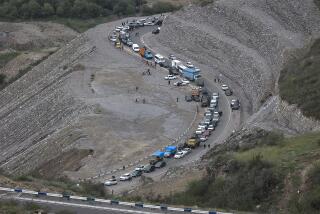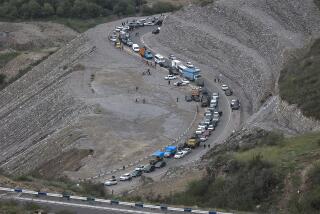Gorbachev Orders Armenia Militants to Give Up Arms : Soviet Union: He cites ‘grave crimes.’ Some in the republic say the decree could stir more bloodshed.
- Share via
MOSCOW — President Mikhail S. Gorbachev moved personally Wednesday to halt mounting violence by armed bands in Armenia by ordering them disbanded and authorizing the police and KGB to seize their weapons if they are not surrendered.
Armenians predicted that Gorbachev’s decree could spark more bloodshed in their strife-weary land, but it showed Moscow’s exasperation at what Soviet officials call the clear connivance of Armenian authorities with thousands of armed militants, considered by many in the Caucasus republic to be their best line of defense against ethnic attack.
In Armenia, locked for 2 1/2 years in an often bloody territorial dispute with neighboring Azerbaijan, ethnic tensions have increasingly been accompanied by attacks on Soviet Interior Ministry troops and other agents of the central government, which many Armenians say are not the acts of nationalist bands but of common criminals.
In one 48-hour period last week, three police posts in the capital of Yerevan were besieged and 10 pistols taken. About 60 armed men forced their way into a police station in the Talin area and ransacked it. In the Masiss district, gunmen hurled Molotov cocktails at a traffic police post and burned it to the ground, while 20 carloads of gunmen blockaded the headquarters of the Armenian Interior Ministry in Yerevan.
Gorbachev’s presidential decree, carried by the official Tass news agency, showed that Moscow’s tolerance for such acts has reached an end. He declared the units of armed irregulars illegal and ordered them disbanded within 15 days. Members must hand over weapons, ammunition and explosives to police, said Gorbachev, who also had ordered Lithuanians to temporarily turn over their firearms when the Baltic republic declared independence in March.
If the militants do not comply, police and KGB units are empowered to seize their arms. If the bands still “endanger the safety of the populace and the state,” Interior Ministry troops and regular army detachments may be deployed to fight them.
Soviet media have put the strength of the Armenian irregulars in the tens of thousands, and one lawmaker, Galina Starovoitova, has said they total from 40,000 to 50,000 men. Some Armenians, however, say such numbers are a fantasy and that the groups have no more than 4,000 members.
In May, more than 20 people were killed when gunmen clashed with troops in the southern republic. Guerrillas ambushed troops at Yerevan’s railway station, and seven men died in the ensuing gun battle.
Gorbachev said it is time to halt the groups’ “grave crimes” that have led to casualities among innocent people. He said criminals, draft-dodgers and deserters from the Soviet armed forces have been swelling their ranks.
His decree unmistakably was motivated by the recent events in Armenia, although he did not refer specifically to the republic. The decree may be used, therefore, to combat armed militants in Kirghizia, Uzbekistan or other strife-torn Soviet regions.
Lt. Gen. Boris Smolny, first deputy commander of Interior Ministry troops, told Tass this month that Armenian authorities have given terrorists “a free hand, and instigate them to take more daring and cruel actions toward not only the police and troops but those compatriots who have changed their minds about illegitimate armed groups.”
However, there was disagreement in Armenia about the effects of Gorbachev’s decree.
Khovik Vassilian, chairman of the Aidak nationalist organization, said Gorbachev’s action could whip up tensions even more.
“The situation will be fraught with serious consequences, since it may lead to bloodshed,” he said.
Vassilian is one of many Armenians who deny that the kinds of illegal acts mentioned by Gorbachev’s decree have anything to do with the self-defense units, which Armenians have dubbed fedayin, a word for “commando” that Vassilian said they have borrowed from the Turkish.
“The fedayin are carrying out self-defense functions, and as a rule they never pose any problems,” Vassilian said. “But some of the firearms have gotten into the hands of a dozen criminal groups, which use them when settling accounts.”
Martin Martirosyan, another Armenian activist, said, “Everything depends on what will be meant by the phrase ‘illegal armed groups.’ ” He said the republic’s Supreme Soviet, or legislature, will discuss whether to declare the fedayin a “republican army” because of the purported failure of Soviet troops and police to protect Armenians’ lives and property.
One reason for Armenians’ apprehension at the results of Gorbachev’s decree is that past uses of Soviet army and Interior Ministry troops to combat manifestations of nationalism in Transcaucasia have led to great bloodshed.
Troops armed with shovels and gas attacked pro-independence demonstrators in Georgia in April, 1989, and killed 19. In January, soldiers drove into the Azerbaijani capital of Baku to break a nationalist blockade, and as many as 200 people were killed.
More to Read
Sign up for Essential California
The most important California stories and recommendations in your inbox every morning.
You may occasionally receive promotional content from the Los Angeles Times.












